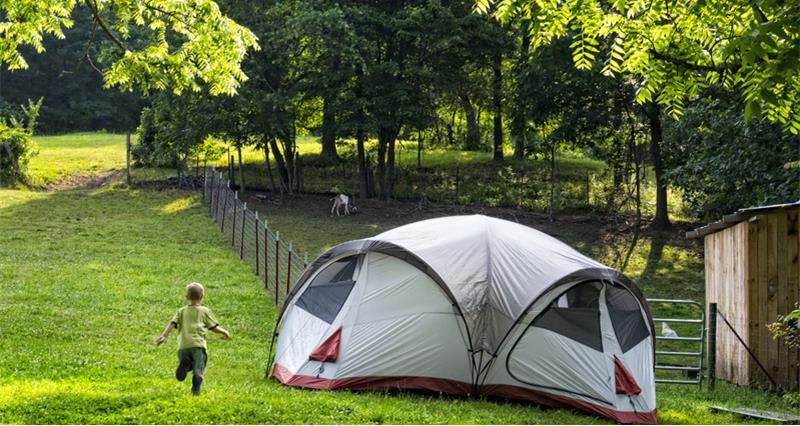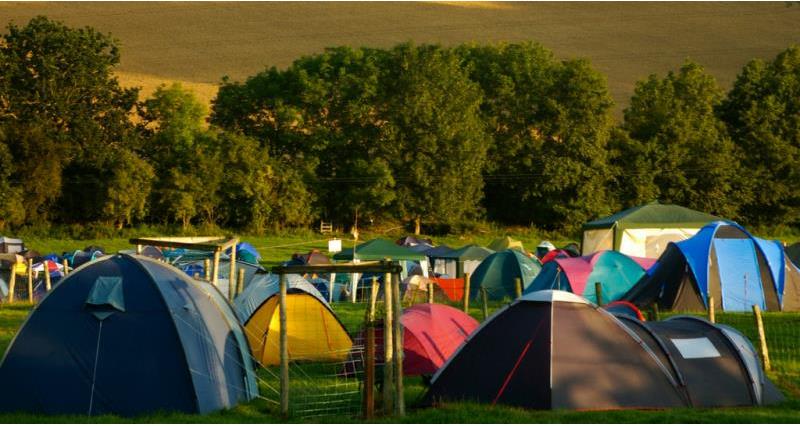The new rights are due to come into force on 26 July 2023 and will allow farmers to host temporary campsites for up to 60 calendar days of the year, up from a previous limit of 28 days.
The changes were made following a consultation ran by the Department for Levelling Up, Housing and Communities from February through to April, during which the NFU submitted a response in support of the proposed changes.
Read our response in full at: Rules on temporary campsites and solar canopies – NFU response
What are the new expanded rights?
Under the new Class BC, a recreational campsite can be erected with no more than 50 pitches. Pitches include any moveable structures for the purpose of recreational camping, as well as campervans and motorhomes.
This does not include caravans, the use of which may trigger the need for planning permission. Applicants must also provide moveable toilet and waste disposal facilities for campsite users.
The changes to filmmaking rules mean that up to 3 hectares of land (up from 1.5) can be used for these purposes for 12 months within any 27 month period. The height allowance for any temporary structures in use has also increased from 15 metres to 20 metres.
If you're currently using Class B to provide campsites for up to 28 days of the calendar year, you can carry on doing so until 25 July 2024.
Conditions
Conditions attached to the new permitted development right are as follows:
- Planning permission will not be required however, the Local Planning Authority will still need to be notified in writing of your intention to use the new permitted development right. You will need to provide a site plan (with details of the toilet and waste facilities) as well as the dates during which the campsite will be in use.
- If your land sits within Flood Zones 2 or 3, a flood risk assessment will need to be submitted via the Prior Approval process; you will need to do this every calendar year. Your Local Planning Authority will then seek comments from the Environment Agency on the acceptance of the scheme
The new permitted development right will not apply:
- where pitches are used for the siting of caravans (except motorhomes)
- if the land is within the curtilage (the area of land attached to a house) of a listed building
- within sites of special scientific interest
- within a scheduled ancient monument
- within a hazard area
- within military explosives storage areas
Impact on BPS
Whilst the news of more flexibility is welcomed, the BPS rules for 2023 (the last year of BPS) have not changed. Here's a reminder on what you need to know:
All of the agricultural land you use to apply for BPS needs to be used primarily for an agricultural activity for the whole calendar year.
The land needed to be at your disposal on 15 May 2023. If agricultural and non-agricultural activities are taking place on the same land, the land will not be eligible if the intensity, nature, duration and timing of the non-agricultural activity significantly interferes with agricultural activity.
There are activities that are allowed for 28 days, these include:
- car parking
- scout or guide camps (or similar)
- caravan sites
The 28 day limit includes all the days the land was unavailable, taking account of preparing the land prior to the event and clearing up afterwards. If an activity lasts less than 24 hours, it still counts as one of the 28 days.
If these activities go over the 28-day limit due to circumstances beyond your control, this might be considered force majeure.
It is also important to point out that some areas and features on agricultural land are non-agricultural and are not eligible for BPS; these can include hard standing and buildings. Such features remain ineligible even if the associated camping activity only takes place within the 28 days allowed under the BPS rules.
NFU members can contact CallFirst onĚý0370 845 8458 for direct professional advice on a comprehensive range of issues: land, employment, legal issues, agriculture, planning, environment, company, transport, health and safety and rates.
*Although every effort has been made to ensure accuracy, neither the NFU nor the author can accept liability for errors and or omissions.
More from »ĘĽŇ»ŞČË:

Rules on temporary campsites and solar canopies – the NFU responds

